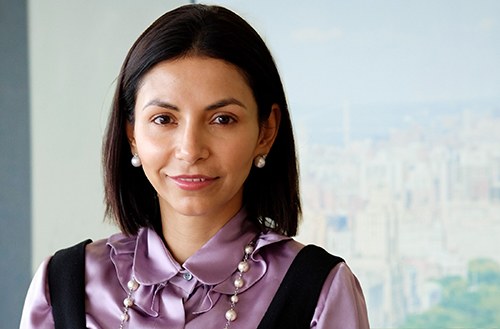
Another way that this has shaped the group’s culture is that we are constantly looking for ways to lift up others and give them the opportunity and support to try out new things and be in the spotlight, especially when it comes to women, people of color and other diverse groups. I see it as my job to encourage those coming up behind me to take chances and be seen. This leads to greater professional fulfillment and inspires others beyond our firm to hopefully do the same amongst their teams.
I think that important actions can be taken at every level of the talent pipeline to help support the next generation of leaders to thrive throughout their careers. These can be grouped into retention and recruitment.
On retention: Developing a mechanism to receive feedback on how the culture supports women and other underrepresented groups is critical. This feedback can provide incredible insights and build trust. However, I would caution that this can’t be performative, and there need to be deliberate efforts to make changes based on the feedback. Another way is to build in and celebrate the mentorship efforts within the organization. If you can celebrate those who take the time to mentor and champion women, I genuinely believe this will lead to progress.
In recruitment: I think that having a robust and inclusive culture is an essential first step to continue attracting diverse talent. As a leader, I view it as my responsibility to be a vocal advocate for inclusion and find ways to support its benefits publicly. Today, with the battle for talent being at its most competitive, we need to ensure that we are out there on the public record making our contributions.
In the Latin American context, we are seeing a significant influx of women in leadership. I look throughout the region and see so many talented organizations doing great work to combat the bias that has limited our potential as a global business community for so long. I feel hopeful that this will continue and that other regions will look to Latin America for best practices on gender parity in the future.
The first piece of advice I would give is that you shouldn’t be afraid to chart your own path. For many of us, our paths will look different than those who came before us because we are different than traditional leaders of the past. This means that this path might feel lonely and awkward at times, which is okay.
Also, it’s critical to get comfortable calling out bias wherever you see it. I would always try to ensure that you are doing it with respect, but it’s important to exercise that muscle.
Unfortunately, as women and individuals of color, we will face bias. The more experience we have engaging in these courageous conversations, the better equipped we will be for the future. I also believe that you shouldn’t feel like you have to address this alone. All organizations are grappling with building inclusive cultures. Take the time to share your concerns with senior leaders that you trust because we are here to support you, but we can’t help address problems unless we are aware of them.
Another key area where I work with my mentees is getting comfortable being authentic at work, while acknowledging it can take courage. For some, this could look like developing a personal style and sharing cultural norms that celebrate who we are. It can also mean sharing information about what is going on in our lives even if it feels vulnerable. The reason that it’s so critical is that research shows that those who develop deep connections at work are more productive and feel more fulfilled. One comprehensive study showed that the number one predictor of a successful team is the psychological safety of that team, or in other words a team’s ability to feel safe to take risks and to be vulnerable in front of each other. I don’t think we can develop these deep relationships if we are hiding our true selves.
Lastly, I would also share the importance of making time for the things that bring you joy. Joy is the antidote to burnout, and it keeps us creative and connected. I think that we often feel that to be successful, as long as we put in the long hours, we will reach the top. That has not been my experience. It is also essential to maintain a multidimensional life that can fuel us for the marathon that is our careers. Building a habit of prioritizing joy is a key life lesson, especially in a business that relies heavily on interpersonal relationships among your team and client base. We are in the people business, after all.
